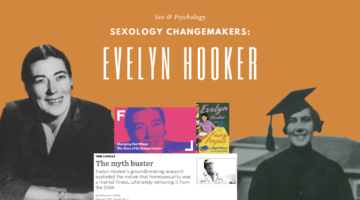Is Kink a Sexual Orientation?
May 13, 2019 by Justin Lehmiller

What does it say about you if you’re into kinky or BDSM sex? Is it a serious leisure activity, or is it an innate aspect of your sexuality? Could the answer be different for different people? A recent article published in the journal Current Sexual Health Reports grapples with these questions [1].
On the one hand, it could be argued that kink/BDSM is a form of serious leisure, one that requires a lot of time, that necessitates a certain level of skill and expertise, and that may even affect self-identification. Research has found that kink/BDSM often fits this bill, and that it overlaps with a lot of the characteristics of the concept of leisure more generally.
Indeed, as the authors of this paper report: in a study of hundreds of BDSM practitioners, the ”general properties of leisure were overwhelmingly endorsed by participants, including the following items reported being present most or nearly always by 90% or more of the total sample: positive emotions, a sense of freedom, pleasure and/or enjoyment, sense of adventure, stress relief and/or relaxation, self-expression, and BDSM enjoyed for itself (intrinsic motivation).”
By the same token, other research suggests that kink/BDSM can potentially be thought of as a sexual orientation. Of course, this depends how you define the term “sexual orientation,” and different scientists approach this in different ways. Some think of it in narrow terms, specifically as something that orients us to partners based on sex/gender; however, others take a more expansive view.
For example, some argue that we have multiple sexual orientations, and that the characteristics of these orientations are as follows: “(a) sexual attraction that is strong and persistent; (b) relative immutability/fluidity of sexual attraction or arousal that is beyond conscious control; (c) early onset, developmentally, in childhood or adolescence; (d) significant psychological consequences to denying, exploring, fulfilling, or repressing sexual attraction and arousal; and (e) lifelong patterns of sexual attraction and arousal” [2].
If you look at kink/BDSM through this lens, there is some support for it as an orientation. For example, research finds that the vast majority of BDSM practitioners report that their sexual interests develop relatively early in life, specifically before the age of 25. Further, a minority of these folks (7-12% across studies) report that their interests actually developed around the time of puberty (between ages 10-12), which is when other traditional aspects of sexual orientation develop (e.g., attraction based on sex/gender).
Ultimately, the authors of this paper don’t advocate for one perspective or the other, and they argue that the leisure and sexual orientation views of kink/BDSM are not mutually exclusive. In other words, both of them may be correct, meaning that perhaps kink/BDSM is a leisure activity for some and more of an orientation for others.
The paper is a fascinating read because it addresses important questions raised by thinking of kink/BDSM as leisure or as an orientation. For example, what are the potential legal, therapeutic, and healthcare implications? There’s a lot to be gained by better understanding kink/BDSM, but we clearly need a lot more research on the subject to know whether it is best characterized as leisure, orientation, or both.
Want to learn more about Sex and Psychology? Click here for more from the blog or here to listen to the podcast. Follow Sex and Psychology on Facebook, Twitter (@JustinLehmiller), or Reddit to receive updates. You can also follow Dr. Lehmiller on YouTube and Instagram.
[1] Sprott, R. A., & Williams, D. J. (2019). Is BDSM a Sexual Orientation or Serious Leisure? Current Sexual Health Reports.
[2] Moser, C. (2016). Defining sexual orientation. Archives of Sexual Behavior, 45(3), 505-508.
Image Credit: 123RF/alphaspirit
You Might Also Like:

Dr. Justin Lehmiller
Founder & Owner of Sex and PsychologyDr. Justin Lehmiller is a social psychologist and Research Fellow at The Kinsey Institute. He runs the Sex and Psychology blog and podcast and is author of the popular book Tell Me What You Want. Dr. Lehmiller is an award-winning educator, and a prolific researcher who has published more than 50 academic works.
Read full bio >

